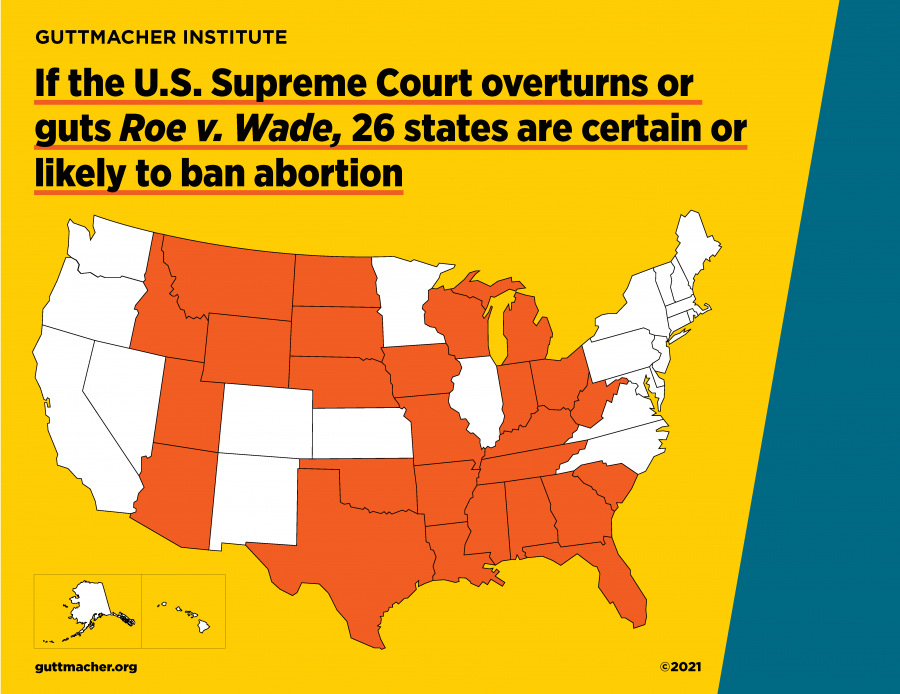Abortion rights for Ohioans depend on Supreme Court ruling on Roe V. Wade
Courtesy of the Guttmacher Institute
Ohio is one of the 26 states where abortion is threatened based on the Supreme Court’s decision.
May 7, 2022
With summer just around the corner, Ohioans are waiting on the Supreme Court to decide if Roe v. Wade should be overturned. Set to be debated in June, the decision poses a threat to the accessibility of abortion and other forms of reproductive health care within the state.
The Supreme Court will decide the outcome of Dobbs V. Jackson’s Women’s Health Organization at the end of term this June. The case, which argues the constitutionality of Mississippi’s 15-week abortion ban, will set the precedent for a state’s ability to dictate abortion rights.
While the official outcome is set for June, an unprecedented leak surfaced May 2 on Politico.com. The site provided the leaked initial majority draft, which shows the justices deciding to reject precedents set nearly 50 years ago by Roe V. Wade. This decision would give states the ability to limit abortion as they see fit.
Abortion rights have been a topic of conversation in Ohio for the past few years. Recent House Bill 598 is a trigger bill which would go into effect should Roe V. Wade be overturned. It would criminalize abortion, including cases of rape. The only exemption would be to save the life a pregnant women.
With bills such as these at the forefront, health care rights seem to hang in the balance.
The overturning or undermining of Roe v. Wade could change lives in many ways.
Doctors may not be required to undergo abortion training. A study in the journal Obstetrics & Gynecology stated that only 44 percent of doctors are “certain or likely” to have access to in-state training if Roe v. Wade is overturned.
The Kent State Women’s Center focuses on guiding patients toward the best solution for their life, focused on the motto, “educate, advocate, and empower.”
While the center aims to support every patient the best it can, the proposed limitations on abortion within the state may make it more difficult for staff to provide care.
“I need to make sure that what I’m doing is within the boundaries of what’s legal, in terms of what resources are available,” Cassandra Pegg-Kirby, director of Kent State’s Women’s Center, said. “It will make a difference, what happens with Roe v. Wade, what I’m able to share with and provide for students.”
The decision could also disproportionately affect minorities, who may use facilities such as the Women’s Center or Planned Parenthood for resources such as period products, birth control, pregnancy tests or abortion access. “Most marginalized communities are going to be the most impacted by this legislation.” Pegg-Kirby said. “I think we can’t have a conversation about this without acknowledging that.”
This controversial topic has politicians divided. While some argue for state’s rights to dictate limitations, others want Roe V. Wade’s precedent to be upheld.
Some politicians, such as Ohio Rep. Jean Schmidt, R-Loveland the sponsor of House Bill 598, are excited about the possibility of Roe V. Wade no longer dictating healthcare in Ohio.
“The time has come for Ohio to truly stand up for the rights of the unborn,” Schmidt said while testifying in front of the Ohio House Oversight Committee.
However, others are refusing to let past decisions be overruled.
“We cannot turn back the clock, and that is why I will continue fighting to codify a woman’s right to choose,” U.S. Rep. Tim Ryan, D-District 13, said in an email.
Until the decision is finalized in June, shelters such as the Kent State’s Women’s Center and politicians alike will help communities fight for what they believe is right.
“We will continue to do the work we’ve always done to let people know that if they come to us and are concerned about things one way or another here’s how you advocate for change,” Pegg-Kirby said. “We’re going to encourage you to use your voice to create the change you see as appropriate.”
Madeleine Majikas is a reporter. Contact her [email protected].

























